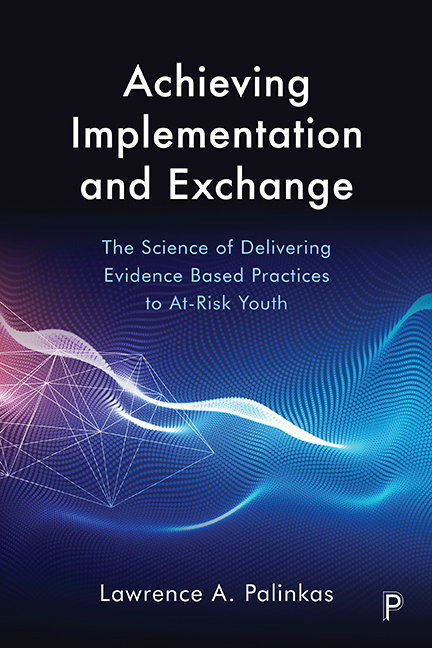 Achieving Implementation and Exchange
Achieving Implementation and Exchange Book contents
- Frontmatter
- Dedication
- Contents
- Tables and figures
- Abbreviations
- Preface
- 1 Introduction
- 2 The need for evidence-based practice
- 3 Understanding and reducing the gap
- 4 EBP implementation in child welfare and child mental health
- 5 Social networks and EBP implementation
- 6 Use of research evidence and EBP implementation
- 7 Local models of EBP implementation
- 8 Research–practice–policy partnerships
- 9 Cultural exchange and EBP implementation
- 10 A transactional model of implementing EBP
- References
- Index
4 - EBP implementation in child welfare and child mental health
Published online by Cambridge University Press: 13 April 2022
- Frontmatter
- Dedication
- Contents
- Tables and figures
- Abbreviations
- Preface
- 1 Introduction
- 2 The need for evidence-based practice
- 3 Understanding and reducing the gap
- 4 EBP implementation in child welfare and child mental health
- 5 Social networks and EBP implementation
- 6 Use of research evidence and EBP implementation
- 7 Local models of EBP implementation
- 8 Research–practice–policy partnerships
- 9 Cultural exchange and EBP implementation
- 10 A transactional model of implementing EBP
- References
- Index
Summary
There is a type of foster care that would like to contract through our county, to open up in this county, and it's evidence-based practice that comes out of Oregon. And the Department of Children's Services likes it, but in talking with other providers and looking at their materials, their costs for training are extraordinary and their fidelity requirements are extraordinary, and consequently, even if I had a grant to pay for it, I’d be less likely to support it than some models. (Mental health services director)
As noted in the last chapter, there are numerous theories, models and frameworks used in implementation science to understand the features of an intervention, an organization and its external environment believed to be associated with implementation outcomes, and to identify strategies designed to facilitate successful implementation (Nilsen, 2015). With all of these theories, models and frameworks to guide the selection of strategies for implementation, why is there a need for yet another theory, model or framework? The answer to this question lies in the emphasis that this model places on the transactions that occur in both social relations and cultural systems and the roles they play in implementation.
In this chapter, we introduce four major studies where the four pillars of implementation science were applied to identify barriers and facilitators to EBP implementation, evaluate strategies designed to overcome barriers and maximize facilitators, and employ innovative methods for examining the process and outcomes of EBP implementation. The lessons learned from each of these studies serve to build upon existing implementation theories, models and frameworks to highlight the roles of social networks, use of research evidence (URE), local models of implementation and evidence, research–practice–policy partnerships (RPPP), and cultural exchanges among implementation stakeholders in implementation processes and outcomes.
The social context of EBP implementation
Social interactions among various stakeholders have been a prominent feature of existing implementation theories, models and frameworks. For instance, Rogers (2003) highlights the role of social networks and the importance of the social system in his diffusion of innovations theory. Greenhalgh and colleagues (2004) hypothesize that organizations that are well connected to other comparable organizations in networks are more susceptible to the network impact in terms of adopting innovations, and that the role of inter-organizational support becomes more important when the implementation of an innovation is more complex.
- Type
- Chapter
- Information
- Achieving Implementation and ExchangeThe Science of Delivering Evidence-Based Practices to At-Risk Youth, pp. 59 - 74Publisher: Bristol University PressPrint publication year: 2018


